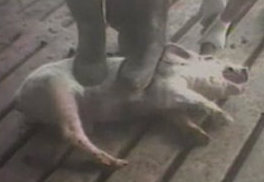Dale and Leilani Neumann are Pentecostal Christians. Their 11 year old daughter, Kara, fell ill. In fact she had (undiagnosed) diabetes. Her parents refused to obtain medical help. Instead they prayed.
‘Kara’s father testified that death was never on their minds. He testified that he knew Kara was sick but was “never to the alarm of death,” and even after she died, her father thought that Jesus would bring Kara back from the dead, as he did with Lazarus.
The parents and friends testified that the parents took tangible steps to help Kara. The mother tried to feed Kara soup and water with a syringe, but the liquid just dribbled out of Kara’s mouth. The father tried to sit Kara up, but she was unable to hold herself up. At some point, Kara involuntarily urinated on herself while lying unresponsive on the couch, so they carried her upstairs and gave her a quick sponge bath while she lay on the bathroom floor.
At one point, Kara’s maternal grandfather suggested by telephone that they give Kara Pedialyte, a nutritional supplement, in order to maintain the nutrients in her body. The mother responded that giving Kara Pedialyte would be taking away the glory from God. Kara’s mother had told another visiting friend that she believed that Kara was under “spiritual attack.”
Friends Althea and Randall Wormgoor testified that they arrived at the Neumanns’ home on Sunday at approximately 1:30 p.m. The Wormgoors saw that Kara was extremely ill and nonresponsive. Her eyes were partially open but they believed she needed immediate medical attention. Randall Wormgoor pulled Kara’s father aside and told him that if it was his daughter, he would take her to the hospital. The father responded that the idea had crossed his mind, and he had suggested it to his wife, but she believed Kara’s illness was a test of faith for their family and that the Lord would heal Kara….’ [1]
But the Lord did not. Or at least not physically. Kara died from diabetic ketoacidosis. The evidence was that, with conventional medical care, she would have lived. Read More »Killing by praying


